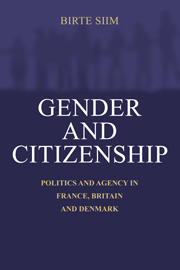Book contents
- Frontmatter
- Contents
- List of Tables and Figures
- Preface
- Abbreviations
- Introduction: Feminist Rethinking of Citizenship
- 1 Towards a Gender-sensitive Framework of Citizenship
- 2 Theories about Citizenship
- 3 Feminist Approaches to Citizenship
- 4 Gender and Citizenship: The French Case
- 5 Gender and Citizenship: The British Case
- 6 Gender and Citizenship: The Danish Case
- Conclusion: Towards a Contextualised Feminist Theory of Citizenship
- Appendix
- Notes
- Bibliography
- Index
Introduction: Feminist Rethinking of Citizenship
Published online by Cambridge University Press: 05 November 2011
- Frontmatter
- Contents
- List of Tables and Figures
- Preface
- Abbreviations
- Introduction: Feminist Rethinking of Citizenship
- 1 Towards a Gender-sensitive Framework of Citizenship
- 2 Theories about Citizenship
- 3 Feminist Approaches to Citizenship
- 4 Gender and Citizenship: The French Case
- 5 Gender and Citizenship: The British Case
- 6 Gender and Citizenship: The Danish Case
- Conclusion: Towards a Contextualised Feminist Theory of Citizenship
- Appendix
- Notes
- Bibliography
- Index
Summary
‘Citizenship’ has become a key word in academic scholarship and in social and political discourse, and the issues of gender and citizenship have recently been taken up by feminist scholarship (Lister 1997a; Bussemaker and Voet 1998). Citizenship is rooted in philosophical and political traditions. The vocabulary of citizenship is about ‘individual rights and obligations’ and about ‘belonging and participation to political communities’. Citizenship is a contextualised concept and is contested. Vocabularies of citizenship are dependent on the social and political context and historical legacies in which they have been developed (Turner 1992). The European welfare states have different vocabularies of citizenship, but there has been no systematic comparison of the implications of different models of citizenship for gender relations (Bussemaker and Voet 1998).
The political scientist Carole Pateman first raised the question of women's citizenship in modern democracies in a path-breaking article in 1985 that addressed women's exclusion from active citizenship and their specific inclusion as mothers (1985). During the last ten years, gender and citizenship have become key questions in feminist scholarship (Pateman 1988; Phillips 1992; Lister 1997a). One of the central themes in the feminist rethinking of citizenship has been a re-establishing of the link between women's social rights and the democratic citizenship that has been one of the legacies of the history of feminism (Hernes 1987; Pateman 1988; Siim 1988, Sarvasy, 1994; Pateman 1996; Lister 1997a).
- Type
- Chapter
- Information
- Gender and CitizenshipPolitics and Agency in France, Britain and Denmark, pp. 1 - 12Publisher: Cambridge University PressPrint publication year: 2000



